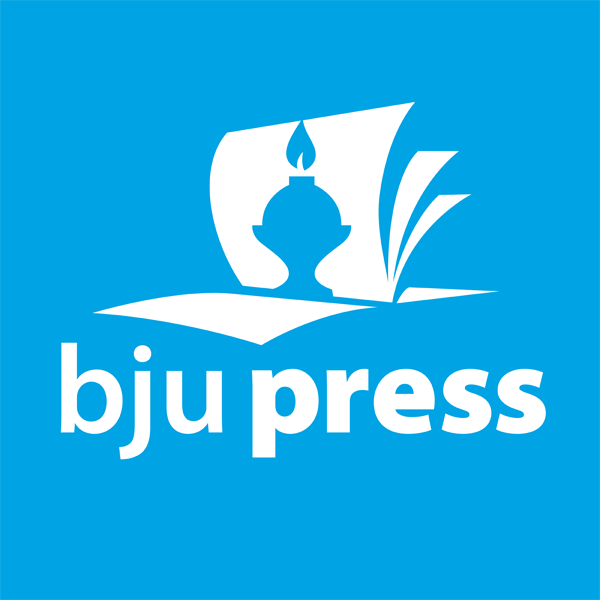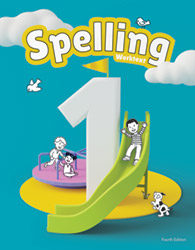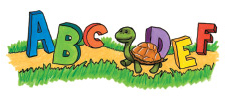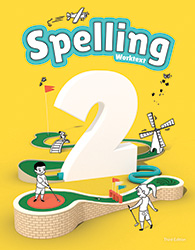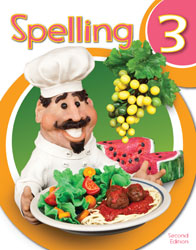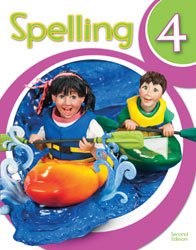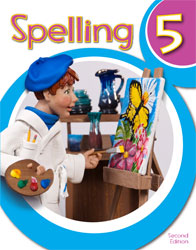BJU Press’s spelling product line equips students to master spelling by recognizing word relationships and structural patterns in grade-appropriate lists. Activities include word study, word sorting, proofreading, dictionary skills, and writing. In the primary grades, word lists contain high-frequency words, phonetic words, and challenge words with irregular spellings. In the intermediate grades, lists add syllable patterns and derivational suffixes. Frequent assessments give opportunities for self-assessment and retrieval practice. They also build student confidence and encourage mastery for producing God-honoring written communication.
Program Approach for Spelling
Biblical Worldview
God created mankind to declare His glory through being like Him. He has made each of us in His image and has called us to imitate His deeds. One way we imitate God is in the use of language. God's attributes are reflected in the characteristics and usefulness of language. The Bible is His Word, and in it He communicates to man His truth and His love.
God has created people with the ability to use language to glorify Him and to show love to others. In order to do this, we must develop our two types of language skills: receptive language (listening and reading) and expressive language (speaking and writing). Spelling is one of the skills needed for effective writing. A biblical worldview sees spelling as a vital tool in the production of God-honoring written communication.
Throughout the BJU Press Spelling program, proofreading and writing activities portray real-life situations in which Christians use writing. Whether using writing to participate in worship, to minister to the needs of others, to provide information, or to complete routine tasks, a Christian realizes accurate spelling is essential for clear written communication.
Academic Rigor + Critical Thinking
Learning to spell is an essential part of learning to communicate accurately in writing. The BJU Press Elementary Spelling product line is designed to equip students with the ability to spell correctly a bank of known words and to apply spelling generalizations to unknown words.
It also equips the students to use a dictionary to check or correct spelling and to proofread effectively. This is accomplished through the development of critical thinking rather than rote memorization.
Meaningful Instruction
Our product line incorporates key elements of the word study approach. Through a balance of direct instruction and interactive learning, the teacher models the thinking process students need to develop. The teacher uses demonstrations, questions, and discussion to guide students in identifying and applying spelling generalizations.
The use of the word study approach strengthens critical thinking so that students understand, retain, and apply spelling skills. In word sorting activities the students investigate words by identifying, comparing, contrasting, and drawing conclusions about spelling patterns and rules. Word sorts help students organize what they know about words and learn generalizations they can apply to unfamiliar words. Dictionary skill lessons support learning to spell the words and help students effectively use the information in a dictionary entry.
Carefully Crafted Word Lists
In the primary grades, students learn that spelling represents the sounds in words. Word lists contain high-frequency words with reliable phonics and structural generalizations. Lists also contain the most common words with irregular spellings as memory or challenge words. In the intermediate grades students discover that spelling also represents meaning. Lists progress to include various syllable patterns, derivation formed by adding suffixes, and words with Greek or Latin word parts.
Vocabulary skills are presented throughout our program. These skills are tied to the spelling generalizations being taught and are used to support learning to spell the words. Review features help students develop spelling mastery. Each weekly list includes review words taken from the previous week's list.
Purposeful Application
Spelling skills give teachers insight into how well students hear sounds and how well they are connecting those sounds to reliable patterns. Also, spelling is an effective indicator of what students know about words and about language.
Our Spelling materials provide opportunities for students to apply the spelling skills and strategies they are learning. Many activities involve using words spelled correctly in a proper context for meaning and usage.
Proofreading and writing experiences transfer the responsibility for accurate spelling to the students and promote a desire to spell correctly. Students grow in their awareness of their own spelling and increase their skill in finding their own spelling errors. Many of the proofreading passages and writing activities portray real-life situations in which Christians use writing. This reinforces our goal that students view spelling as a tool to be used to honor God and to love and serve others.
Love for Learning
Making Spelling Enjoyable and Encouraging Success
The BJU Press Spelling program includes colorful Worktexts with enjoyable themes. Our Worktext pages have age-appropriate art, photo, and page design features that are not distracting. Spelling skills are presented in a variety of interesting ways. Interactive lessons provide opportunities for the students to actively participate in the learning process. We use review activities and games to stimulate interest while providing worthwhile practice.
The Spelling program is designed to foster success in each student. Our desire is that each student understands that he can learn to spell, he can remember the spelling of the types of words he has learned about, and he can apply what he has learned to unfamiliar words.
Writing lessons provide opportunities for real-life application of spelling and writing skills. Activities include journaling, designing a brochure, making a list to organize information, writing in response to a Bible passage, and writing a card or letter. Lessons begin with a story or discussion, and then the students complete an activity related to the lesson. For example, after a story in which the characters write a thank-you note, the students write a thank-you note they can give to someone.
Materials
Below are the standard Spelling materials provided for each elementary grade. Some grades may include additional pieces.
Spelling 1 Teacher's Edition
Contains a reduced copy of the student text with answer overprints as well as lesson notes to guide the teacher through the instruction of the material. Also contains a CD with supplemental activities, test forms, and teacher aids.
Spelling 1 Student Worktext
Includes activities to reinforce the spelling patterns being taught in Spelling 1 and to strengthen communication skills. Thirty weekly spelling lists are included, and each list contains approximately 10 words.
Spelling 2 Teacher's Edition with CD
Coordinates all instruction and activities with an appendix containing supplemental material as well as a reduced copy of the student text containing answer overprints and lesson notes.
Spelling 2 Student Worktext
Colorful worktext pages contain activities such as word sorting, word studies, proofreading, dictionary skills, and writing to strengthen spelling and communication skills.
Spelling 3 Teacher's Edition with CD
It contains a reduced copy of the student text with answer overprints as well as lesson notes to guide the teacher through the instruction of the activities. It also includes short stories about Daniel and Sophia to help students learn about how Christians can use spelling in everyday life. The CD contains additional helpful teaching material such as assessment and test forms, review pages, activities and games, and supplemental writing activities.
Spelling 3 Student Worktext
Students will enjoy the textbook’s food-themed activities that help reinforce spelling patterns, strengthen dictionary, proofreading, and communication skills. Each of the 32 weekly spelling lists consists of 16 pattern words, 2 review words, and 2 memory words.
Spelling 4 Teacher's Edition with CD
It contains a reduced copy of the student text with answer overprints as well as lesson notes to guide the teacher through the instruction of the activities. It also includes short stories about Leo, Leah, Juan, and Natalia to help students learn about how Christians can use spelling in everyday life.The CD contains additional helpful teaching material.
Spelling 4 Student Worktext
Students will interact with the textbook’s sports theme through several activities that help reinforce spelling patterns, strengthen dictionary, proofreading, and communication skills. Contains 32 weekly spelling lists consisting of 16 pattern words, 2 review words, and 2 challenge words
Spelling 5 Teacher's Edition with CD
It contains a reduced copy of the student text with answer overprints as well as lesson notes to guide the teacher through the instruction of the activities. The CD contains additional helpful teaching material such as assessment and test forms, review pages, activities and games, and supplemental writing activities.
Spelling 5 Student Worktext
Students will explore the arts through activities that help reinforce spelling patterns, strengthen dictionary, proofreading, and communication skills. Each of the 32 weekly spelling lists consists of 20 pattern words and 5 review words.
Spelling 6 Teacher's Edition
The Teacher's Edition provides information on the Greek and Latin words that make up the spelling units. A special dictionary section features the character Detective Dick Shanary as he follow six exciting cases, climaxing in the capture of the criminal Werds and his accomplice, Miss Spelling.
Spelling 6 Student Worktext
Contains a variety of spelling exercises, etymology sections, and studies of common Greek and Latin word roots.
Scope & Sequence

Spelling 1
30 Weekly Word Lists
Ten words per list (nine pattern words and one sight word); Words frequently used in writing; Review list with pattern words every fifth week
Generalizations
Phonics generalizations: short and long vowel patterns, r-influenced vowel patterns, diphthongs; Consonant patterns: consonants, consonant blends and digraphs, soft c; Structural generalizations: suffixes s, es, ed, er, est, ing; suffix rules: no change to base word, double the final consonant, drop the final e
Word Study
Phonics and structural analysis activities; Word-meaning activities: sentence contexts, rhyming words, meaning or picture clues, puzzles
Proofreading
Spelling awareness: identifying the correct spelling for a given word, identifying and correcting misspelled words, standardized-test practice
Dictionary Skills
Location skills; Alphabetical order to the first and second letter; Entry words, guide words, word forms, sample sentences
Writing Application
Dictation sentences in tests

Spelling 2
32 Weekly Word Lists
Words frequently used in writing; Patter words and irregular spelling words; Interactive study method; Weekly review of patterns
Generalizations
Phonics generalizations; Vowel patterns: short and long vowels, r-influence vowels, diphthongs; Consonant patterns: consonants, consonant blends and digraphs, soft c, soft g, silent consonants; Two-syllable words ending in le, er, y, and reliable patterns; Structral generalizations; Compound words; Contractions; Suffixes: s, es, ed, ing, er, est; Suffix rules: no change to the base word, double the final consonant, drop the final e, change y to i
Word Study
Word sort: classifying words based on shared features; Word building: making new words by adding or omitting letters; Phonics and structural analysis activities; Word-meaning activities: contexts, definitions, synonyms, antonyms, homophones
Proofreading
Spelling awareness; identifying and correcting misspelled words in sentences or passages; Identifying the correct spelling for a given word; Standardized-test practice
Dictionary Skills
Location skills; Alphabetical order to the first, second, and third letter; Entry words, guide words, word forms
Writing Application
Dictation sentences in tests; Real-life writing application

Spelling 3
32 Weekly Word Lists
Words frequently used in writing; Pattern words and irregular spelling words; Interactive study method; Weekly review of patterns
Generalizations
Phonics generalizations; Vowel patterns: short and long vowels, r-influence vowels, diphthongs; Consonant patterns: consonants, consonant blends and digraphs, soft c, soft g, silent consonants; Two-syllable words ending in le, er, y, and reliable patterns; Structral generalizations; Compound words; Contractions; Suffixes: s, es, ed, ing, er, est; Suffix rules: no change to the base word, double the final consonant, drop the final e, change y to i
Word Study
Word sort: classifying words based on shared features; Word building: making new words by adding or omitting letters; Phonics and structural analysis activities; Word-meaning activities: contexts, definitions, synonyms, antonyms, homophones
Proofreading
Spelling awareness; identifying and correcting misspelled words in sentences or passages; Identifying the correct spelling for a given word; Standardized-test practice
Dictionary Skills
Location skills; Alphabetical order to the first, second, and third letter; Entry words, guide words, word forms, definitions; Syllable division: compound words; words with two middle consonants; words ending in le; open and closed syllables
Writing Application
Dictation sentences in tests; Real-life writing application

Spelling 4
32 Weekly Word Lists
Word lists: 16 pattern words, 2 challenge words, 2 review words; Interactive study method
Generalizations
Phonics generalizations long, short, and r-influence vowels; Sounds; diphthongs; reliable patterns in two-syllable words; unstressed-syllabel vowel patterns; Structral generalizations: compound words, inflectional suffixes, prefixes, derivational suffixes; Suffix rules: no change to the base words, doubling the final consonant, dropping the final e, changing y to i
Word Study
Word sorting: classifying words based on shared features; Word building: forming words by manipulating patterns, syllables, affixes; Word-meaning: using a word in the context of meaning (definitions, synonyms, antonyms, homophones, homographs, categories, analogies)
Proofreading
Spelling awareness; identifying the correct spelling for a given word, identifying and correcting misspelled words in sentences or passages; Standardized-test practice
Dictionary Skills
Location skills; Alphabetical order to the fourth letter: alphabetizing words between guide words; Use of the pronunciation key; Use of a dictionary entry: entry word, pronunciation, word forms, definitions, sample sentences; Syllable division: base words and affixes, two-syllable vowel-consonant patters, unstressed syllables; Accentingn syllables: words with affixes, syllable patterns
Writing Application
Dictation sentences in weekly tests; Real-life writing application

Spelling 5
32 Weekly Word Lists
Word lists: 20 pattern words, 5 review words; Interactive study method
Generalizations
Phonics generalizations: review of long, short, and r-influence vowels sounds; diphthongs; reliable patterns in multi-syllable words; unstressed syllable vowel patterns; Structral generalizations: compound words, inflecional suffixes, prefixes, derivational suffixes; Suffix rules: no change to the base word, doubling the final consonant, dropping the final e, changing y to i
Word Study
Word sorting: classifying words based on shared features; Word building: forming words by manipulating patterns, syllables, affixes; Word-meaning: using a word in context of meaning (definitions, synonyms, antonyms, homophones, homographs, categories, analogies)
Proofreading
Spelling awareness: identifying the correct spelling for a given word, identifying and correcting misspelled words in sentences or passages; Standardized-test practice
Dictionary Skills
Location skills; Alphabetical order to the fourth letter: alphabetizing words between guide words; Use of the pronunciation key; Use of a dicitonary entry: entry word, pronunciation, word forms, definitions, sample sentences, etymology; Syllable division: base words and affixes, two-syllable vowel-consonant patterns, unstressed syllables; Accenting syllables: compound words, words with affixes, syllable patterns, accent changes in homographs
Writing Application
Dictation sentences in weekly tests; Real-life writing application

Spelling 6
32 Weekly Word Lists
Word lists: 25 words (20 pattern words, 5 review words); Interactive study method
Generalizations
Phonics generalizations: reliable patterns in multi-syllable words, including review of previously learned vowel and consonant patters; unstressed syllable vowel patterns; Structral generalizations: compound words, inflecional suffixes, prefixes, derivational suffixes; Suffix rules: no change to the base word, doubling the final consonant, dropping the final e, changing y to i; Etymology: Greek word oarts; Latin prefixes, roots, and suffixes
Word Study
Word sorting: classifying words based on shared features; Word building: forming words by manipulating patterns, syllables, affixes, word roots; Word-meaning: using a word in context of meaning (definitions, synonyms, antonyms, homophones, homographs, categories, analogies, derivations, and sentence completion)
Proofreading
Spelling awareness: identifying and correcting misspelled words in sentences or passages; Standardized-test practice
Dictionary Skills
Alphabetical order: alphabetizing words between guide words; Use of the pronunciation key; Use of a dicitonary entry: entry word, pronunciation, parts of speech, word forms, definitions, sample phrases or sentences, etymology; Syllable division: base words and affixes, two-syllable vowel-consonant patterns, unstressed syllables; Accenting syllables: compound words, words with affixes, syllable patterns, accent shifts in homographs and derivations
Writing Application
Dictation sentences in weekly tests; Real-life writing application
